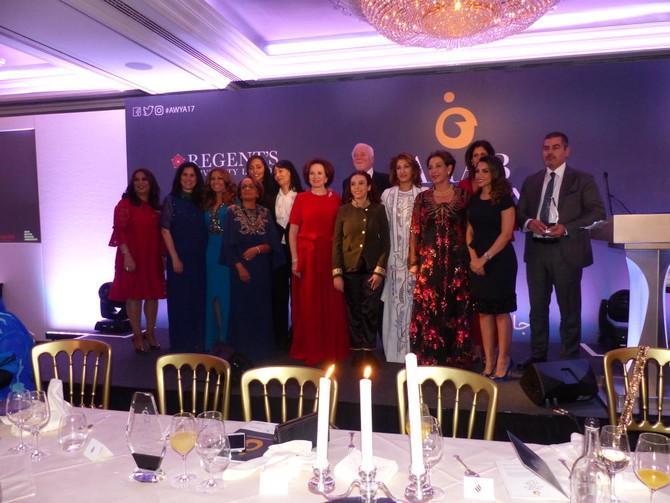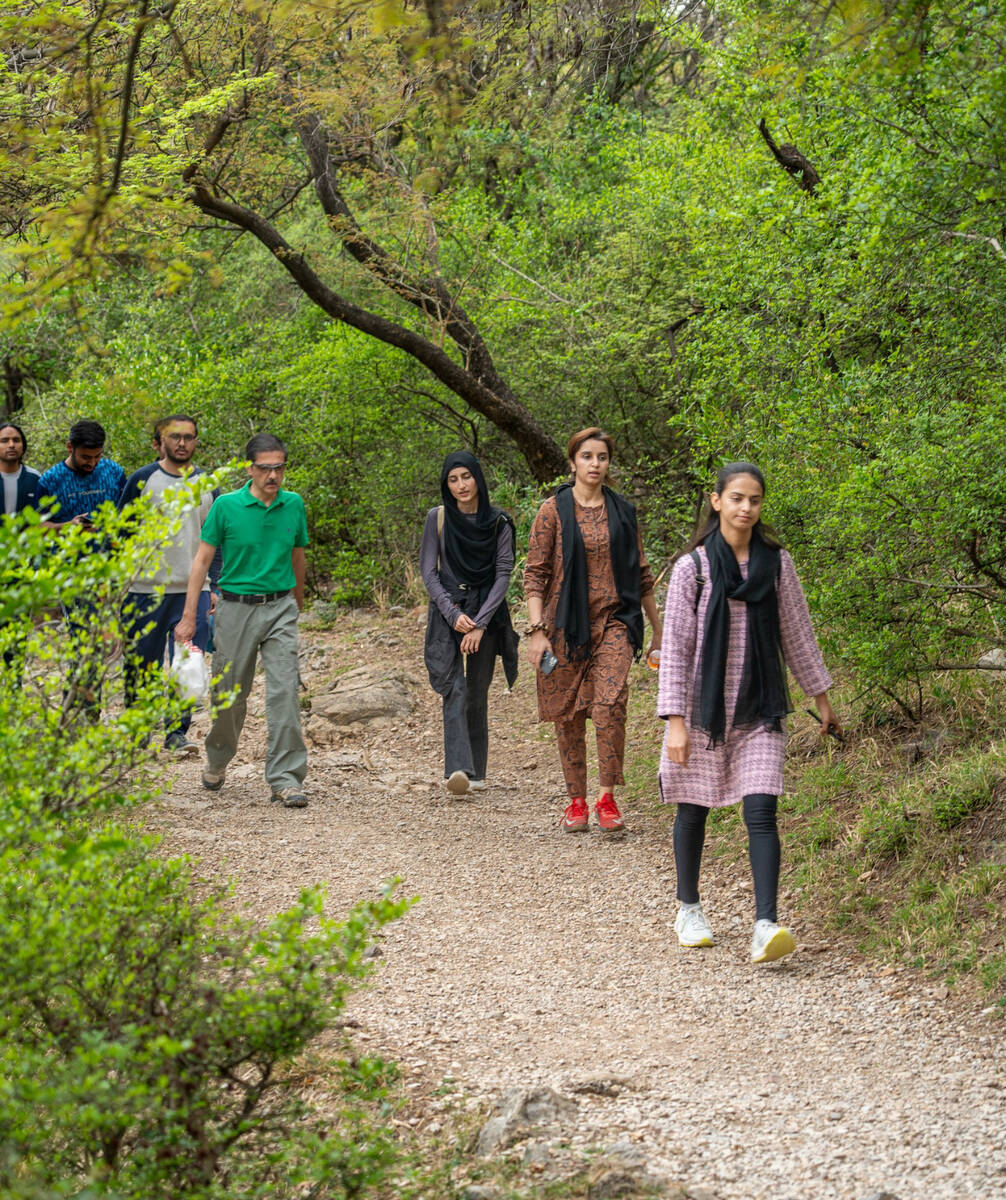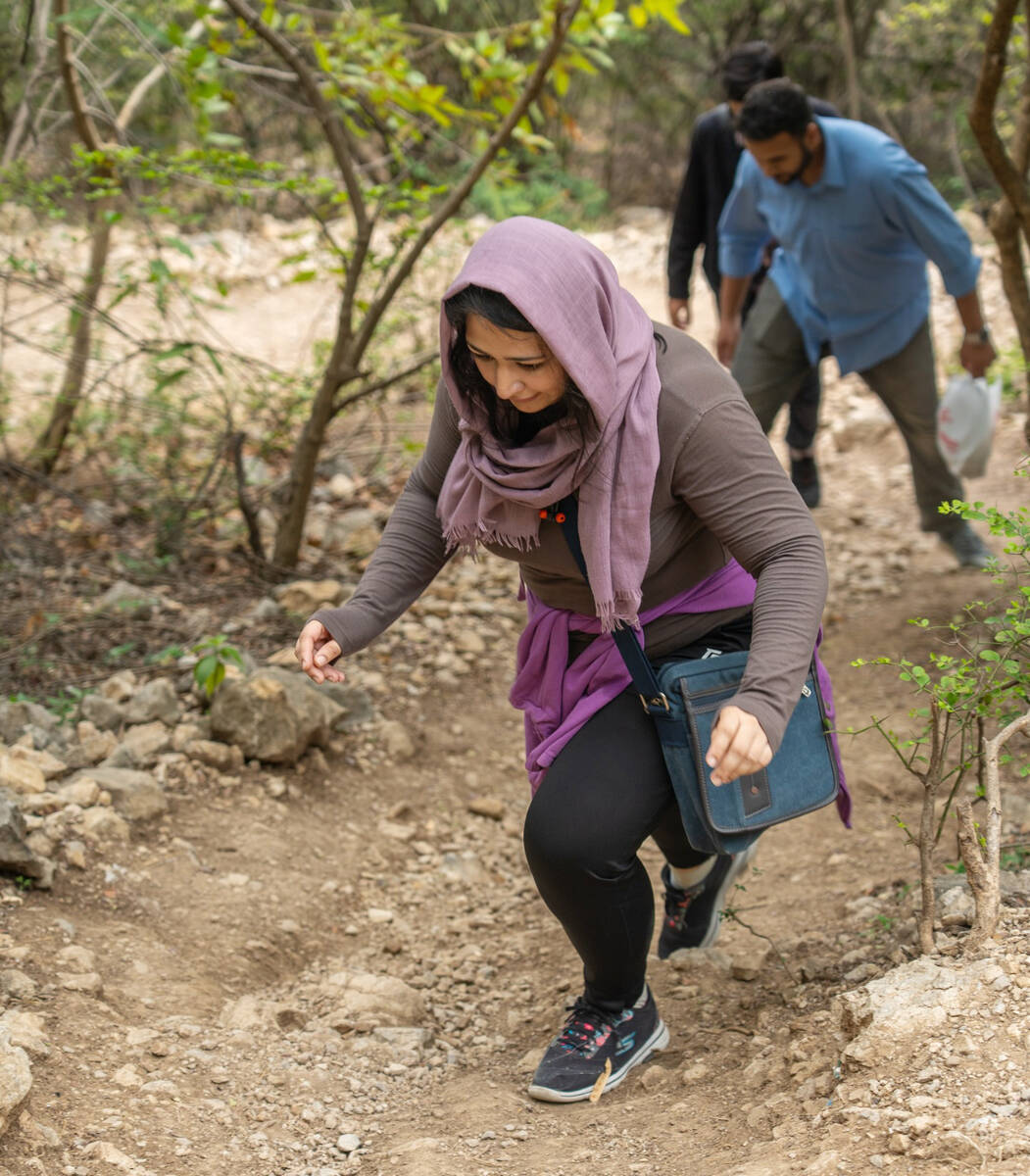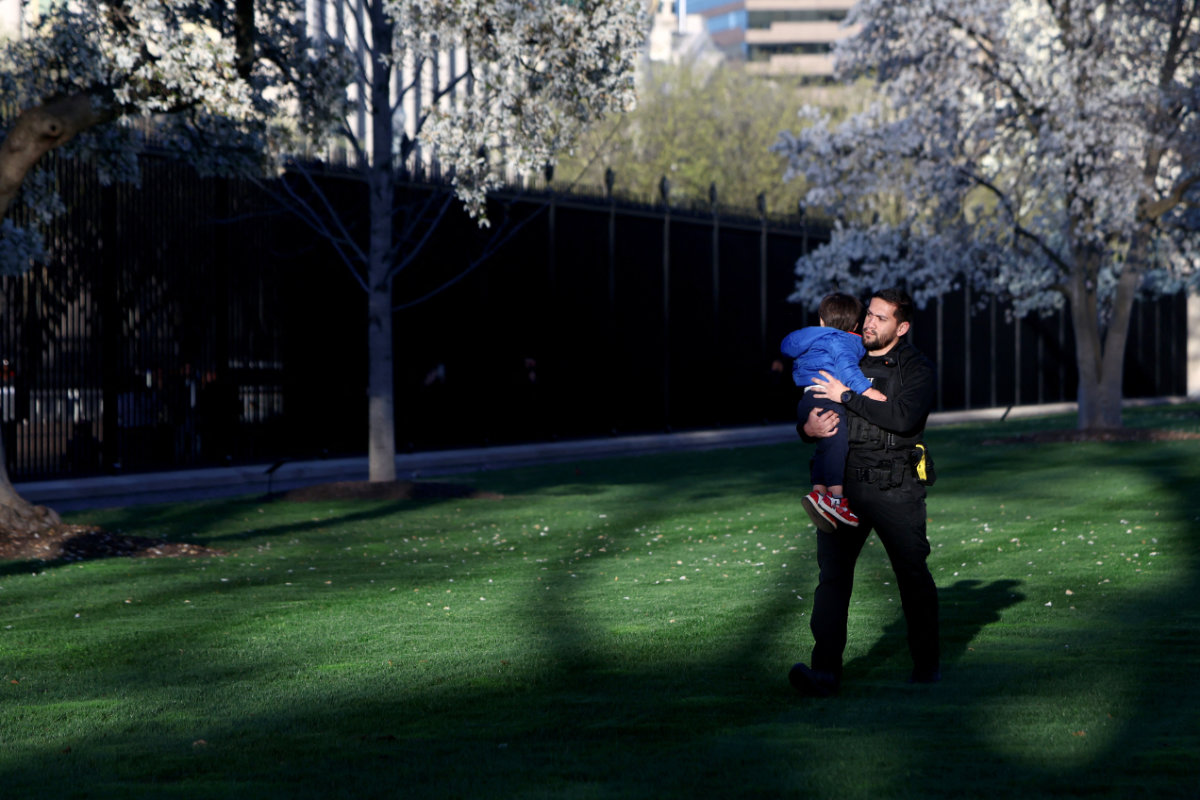Princess Lamia Bint Majid Al-Saud was named winner of the Achievement in Philanthropies Award at the Arab Women of the Year 2017 held in London on Thursday.
Princess Lamia is Secretary General and member of the board of trustees at Alwaleed Philanthropies which over the past 35 years has supported and initiated projects in more than 124 countries regardless of gender, race or religion.
The Foundation collaborates with a range of philanthropic, government and educational organizations to combat poverty, empower women and youth, develop communities, provide disaster relief and create cultural understanding through education.
Princess Lamia was among eleven outstanding Arab women recognized for their achievements in a wide range of categories including social leadership, culture, music, women’s advancement, trade development, motivation and wellbeing, education, journalism and public awareness.
A special award was presented to a program created by the OLE.IRD and UNHCR called ‘The Tiger Girls’. Tiger Girls, which stands for ‘These Inspiring Girls Enjoy Reading’, enables 120 Syrian girls in the Zaatari refugee camp, supported by Syrian female coaches, to participate in team-based learning. Present to accept the award alongside her colleagues was UNHCR senior adviser, Reem bint Amr bin Abdelhamid from Saudi Arabia.
Event organizer Omar Bdour, Ceo, London Arabia Organization, said he had been completely overwhelmed with emotion when he visited the Zaatari camp in Jordan and met the young women benefitting from the program.
He described a moving moment during his visit to the desert camp when young girls released balloons carrying messages describing their hopes and dreams. For young people who “have almost nothing,” he said, “their hopes and dreams are all that sustain them but that doesn’t mean they don’t want to break out of their box.”
He added that the Arab Women Awards celebrated Arab women who ‘aspire to make a difference.’
Award Advisory Chairman, Professor Aldwyn Cooper, Vice-Chancellor and Ceo, Regent’s University London, said in the Arab world educational institutions are climbing up the global world rankings. He saw as a valuable element in this trend the social change being led and supported by the country’s rulers. “There is recognition of the knowledge, skills and innovation of Arab women in many fields,” he said.
On the UK, he said: “It is important that we recognize Arab students as creating genuine inputs into the cultures of our universities with new perspectives, new ideas and real innovation.”
He said there would be announcements made by the UK government on Tuesday, Dec. 5, 2017, about changes to the visa arrangements for students studying in the UK and staying to contribute to the British economy.
He said: “We are open for business in Britain for education and everything else.”
Guest speaker Desiree Bollier, chairwoman and global chief merchant, value retail management, said women make up 67 percent of her organization’s workforce.
“Women are wives and mothers and working. All we have done over the years is stretch their days and hours. The average work and social life and expectation of being a wife, mum and working woman is an average 14-hour day. We support these women with flexible hours – the office today is merely a mobile – you can do your work from anywhere.”
The glittering awards evening, hosted by Saudi social media influencer and entrepreneur Bayan Linjawi, was held in the Jumeirah Carlton Hotel in Knightsbridge. Entertainment was provided by the Scottish Egyptian multi-instrumentalist Ayoub Sisters, Sarah and Laura who played a range of wonderful classic pieces
The event was attended by royals, diplomats and a host of high achieving women showing their support for the award winners.
Dr. Hania Mursi Fadl, winner of the achievement in social leadership award, is one of the first Sudanese women to be trained as a radiologist. She established the Khartoum Breast Care Center using a family foundation fund of $14 million. The KBCCC is the only fully equipped and staffed cancer center available to women in the region.
Sheikha Intisar Alsabah, of Kuwait, winner of the achievement in community development award, is the founder of Alnowair, a first of its kind non-profit initiative in region.
The achievement in culture award went to Dr. Maha El-Khalil Chalabi. Born in the southern Lebanese city of Tyre, Chalabi has led numerous welfare and cultural campaigns for her native city which has been on UNESCO’s World Heritage List since 1984. She notably initiated the establishment of a medical and social care center and the International Festival of Tyre.
The well-known Kuwaiti singer Nawal El-Kuwaitia won the achievement in music award. She is known as The Queen of Classic Music and famed for her Harp of Khaliji Song, the Gulf’s Fairooz and the Sun and Moon of Kuwait. She currently has 16 albums and has collaborated with many composers and poets.
Yasmine Sabri won the award for achievement in promoting women’s advancement. Sabri, who was a professional swimmer in Egypt, shot her first movie in Mumbai and was number one in the box office. She participated in the “You are more important campaign” celebration – “Smile of Gold” at the Childrens’ Cancer Hospital during the World Children Cancer Day.
Shaikha Hind Al-Khalifa won the achievement in trade development award. Shaikha Hind was born and raised in the city of Muharraq, Bahrain and served as the Assistant Under-Secretary for the Ministry of Labor and Social Affairs. She is president of the Bahrain International Federation for Business and Professional Women.
The winner of the achievement in motivation and wellbeing award was Hala Kazim. She is a certified counselor and coach from the City University, London. Kazim established ‘Journey through Change’ in 2011 to positively impact people’s lives by taking them out of their comfort zone and expanding their intellectual boundaries.
The achievement in education award went to Professor Karma Nabulsi a Fellow in Politics at St. Edmund Hall who lectures at the University of Oxford where she is currently Director of Undergraduate Studies at the Department of Politics and International Relations. Dr. Nabulsi recently directed, co-edited and co-curated ‘The Palestinian Revolution,’ a bilingual Arabic-English digital humanities and teaching resource exploring Palestinian revolutionary thought and practice in the 1950s, 60s and 70s.
Ragihda Dergham won the achievement in journalism award. Dergham is the Founder and Executive Chairman of Beirut Institute, a cutting edge independent think tank for the Arab region. She has been a columnist and senior diplomatic correspondent for the London based Al Hayat daily since 1989.
Hind Al-Eryani won the achievement in public awareness award. She is a writer, journalist whose articles are widely published on media including TV5, Alsafeer, and Lebanon Now.
Eryani has led many campaigns against Qat highlighting its negative effects on the economy, water and agriculture. Her latest campaign promotes peace in Yemen.
Arab Women of the Year 2017 was partnered and sponsored by Regent’s University London, Bicester Village, La Vallee Village, London & Partners and the Arab British Business Association.
Saudi women shine at Arab Women of the Year awards in London
Saudi women shine at Arab Women of the Year awards in London

Fitness enthusiasts challenge themselves with pre-iftar hikes in Pakistani capital

- Hikers set out hour before sunset, break fast on trails on Margalla Hills National Park
- Participants say pre-iftar hikes help boost fat burning, maintain weight in Ramadan
ISLAMABAD: Zarnab Tahir struggled to catch her breath as the steep incline of the hiking trail at Islamabad’s picturesque Margalla Hills tested her endurance. Hiking can put people through physical exertion, especially when they do it on an empty stomach.
An hour before the sun sets and the call to prayer blares out from various mosques located in Pakistan’s capital city, a group of fitness enthusiasts take to the hiking trails in Margalla Hills National Park.

Islamabad Run With Us — IRU — which describes itself as Pakistan’s “pioneering running community,” is behind the pre-iftar hiking initiative.
“When you engage in pre-iftar (physical) activities during Ramadan, it gives you extra energy, an extra boost,” Qasim Naz, who founded IRU in 2016, told Arab News on hiking trail number three.

“And when someone joins in on an activity once or twice, they figure out it’s not that hard and they can sustain it comfortably.”
Naz stresses that staying active during the holy month is essential. The IRU organizes five activities a week, which include two runs and three hikes.

“Either we can maintain our weight, or if our goal is weight loss, we can achieve it by being in a calorie deficit while eating a healthy diet and exercising,” Naz explained.
Tahir, 22, meanwhile, said that she was committed to reaching the top of hiking trail before sunset. This was the second time she was hiking with IRU.

She agreed with Naz that group activities are “much easier” to sustain.
“I think it is important to go at your own pace and it’s so much easier with the group,” Tahir, a content creator, told Arab News.

“If you go alone, it’s kind of more difficult and you are, like, really slow but if you go with the group you can maintain that pace and I think it’s much easier that way.”
Mahwish Ashraf, a journalist associated with a foreign diplomatic mission in Islamabad, shared how she struggled the first time that she went on a pre-iftar hike with IRU.
“The first time I was hiking, I returned from in between, I couldn’t complete it,” she admitted. “So, this is my second time hiking with the IRU, and gladly, I’m at the main point, the meeting point.”
Eraj Khan, a commercial specialist visiting from Australia to spend Ramadan with his family, said pre-iftar hikes give one “lots of energy.”
“For fat burning, it’s a great activity,” Khan said. “Especially because the last two hours of fasting are the hardest, most people feel really hungry. But so far, I’m loving it.”
As the clock continued to tick and evening settled in, the hikers began to pick up their pace. For Tahir, reaching the top of the trail before sunset was a victory in itself.
She had pushed past exhaustion, embraced the challenge and proved to herself that she was capable of more than she thought she could achieve.
And according to her, hiking with the group made all the difference.
“The energy of the group keeps you going,” she said. “Even when you feel like stopping, you see everyone else moving forward, and you push through.”
Arctic sea ice hits lowest peak in satellite record, says US agency

- Arctic sea ice forms and expands during the dark, frigid northern winter, reaching its seasonal high point in March
- In recent years, less new ice has formed, and the accumulation of multi-year ice has steadily declined
WASHINGTON: This year’s Arctic Sea ice peak is the lowest in the 47-year satellite record, according to data released by the US National Snow and Ice Data Center (NSIDC) on Thursday, as the planet continues to swelter under the mounting effects of human-driven climate change.
Arctic sea ice forms and expands during the dark, frigid northern winter, reaching its seasonal high point in March. But in recent years, less new ice has formed, and the accumulation of multi-year ice has steadily declined.
The maximum sea ice level for 2025 was likely reached on March 22, measuring 14.33 million square kilometers (5.53 million square miles) — below the previous low of 14.41 million square kilometers set in 2017.
“This new record low is yet another indicator of how Arctic sea ice has fundamentally changed from earlier decades,” said NSIDC senior research scientist Walt Meier in a statement.
“But even more importantly than the record low is that this year adds yet another data point to the continuing long-term loss of Arctic sea ice in all seasons.”
The Arctic record follows a near-record-low summer minimum in the Antarctic, where seasons are reversed.
The 2025 Antarctic sea ice minimum, reached on March 1, was just 1.98 million square kilometers, tying for the second-lowest annual minimum in the satellite record, alongside 2022 and 2024.
Combined Arctic and Antarctic sea ice cover — frozen ocean water that floats on the surface — plunged to a record low in mid-February, more than a million square miles below the pre-2010 average. That is an area larger than the entire country of Algeria.
“We’re going to come into this next summer season with less ice to begin with,” said Linette Boisvert, an ice scientist at NASA’s Goddard Space Flight Center in Greenbelt, Maryland. “It doesn’t bode well for the future.”
US scientists primarily monitor sea ice using satellites from the Defense Meteorological Satellite Program (DMSP), which detect Earth’s microwave radiation.
Because open water and sea ice emit microwave energy differently, the contrast allows sea ice to stand out clearly in satellite imagery — even through cloud cover, which obscures traditional optical sensors.
DMSP data is supplemented with historical records, including early observations from the Nimbus-7 satellite, which operated from 1978 to 1985.
While floating sea ice does not directly raise sea levels, its disappearance sets off a cascade of climate consequences, altering weather patterns, disrupting ocean currents, and threatening ecosystems and human communities.
As reflective ice gives way to the darker ocean, more solar energy is absorbed rather than reflected back into space, accelerating both ice melt and global warming.
Shrinking Arctic ice is also reshaping geopolitics, opening new shipping lanes and drawing geopolitical interest. Since taking office this year, US President Donald Trump has said his country must control Greenland, a Danish autonomous territory rich in mineral resources.
The loss of polar ice spells disaster for numerous species, robbing polar bears, seals, and penguins of crucial habitat used for shelter, hunting, and breeding.
Last year was the hottest on record, and the trend continues: 2025 began with the warmest January ever recorded, followed by the third-warmest February.
NOAA predicts that La Nina weather conditions, which tend to cool global temperatures, are likely to give way to neutral conditions that would persist over the Northern Hemisphere summer.
Polar regions are especially vulnerable to global warming, heating several times faster than the global average.
Since mid-2023, only July 2024 fell below 1.5 degrees Celsius of warming, raising concerns that the Paris Agreement’s goal of limiting long-term warming to 1.5C may be slipping out of reach.
Satanist leader’s attempt to hold ‘Black Mass’ inside US statehouse sparks chaos and arrests

- Kansas City-area Satanic Grotto rallied to protested what members called the state’s favoritism toward Christians in allowing events inside the statehouse
- Members of the satanic cult said their rally was in support free speech rights and religious freedoms guaranteed by the US Constitution’s First Amendment
TOPEKA, Kansas: The leader of a small group of self-described satanists and at least one other person were arrested Friday following a scuffle inside the Kansas Statehouse arising from an effort by the group’s leader to start a “Black Mass” in the rotunda.
About 30 members of the Kansas City-area Satanic Grotto, led by its president, Michael Stewart, rallied outside the Statehouse for the separation of church and state. The group also protested what members called the state’s favoritism toward Christians in allowing events inside. Gov. Laura Kelly temporarily banned protests inside, just for Friday, weeks after Stewart’s group scheduled its indoor ceremony.
The Satanic Grotto’s rally outside drew hundreds of Christian counterprotesters because of the Grotto’s satanic imagery, and its indoor ceremony included denouncing Jesus Christ, who Christians believe is the Son of God. About 100 Christians stood against yellow police tape marking the Satanic Grotto’s area. The two groups yelled at each other while the Christians also sang and called on Grotto members to accept Jesus. Several hundred more Christians rallied on the other side of the Grotto’s area, but further away.
Kelly issued her order earlier this month after Roman Catholic groups pushed her to ban any Satanic Grotto event. The state’s Catholic Bishops called what the group planned “a despicable act of anti-Catholic bigotry” mocking the Catholic Mass. Both chambers of the Legislature also approved resolutions condemning it.

“The Bible says Satan comes to steal, kill and destroy, so when we dedicate a state to Satan, we’re dedicating it to death,” said Jeremiah Hicks, a pastor at the Cure Church in Kansas City, Kansas.
Satanic Grotto members, who number several dozen, said they hold a variety of beliefs. Some are atheists, some use the group to protest harm they suffered as church members, and others see Satan as a symbol of independence.
Amy Dorsey, a friend of Stewart’s, said she rallied with the Satanic Grotto to support free speech rights and religious freedoms guaranteed by the US Constitution’s First Amendment, in part because Christian groups are allowed to meet regularly inside the Statehouse for prayer or worship meetings.
Before his arrest, Stewart said his group scheduled its Black Mass for Friday because it thought the Kansas Legislature would be in session, though lawmakers adjourned late Thursday night for their annual spring break. Stewart said the group might come back next year.
“Maybe un-baptisms, right here in the Capitol,” he said.
Video shot by KSNT-TV showed that when Stewart tried to conduct his group’s ceremony in the first-floor rotunda, a young man tried to snatch Stewart’s script from his hands, and Stewart punched him. Several Kansas Highway Patrol troopers wrestled Stewart to the ground and handcuffed him. They led him through hallways on the ground floor below and into a room as he yelled, “Hail, Satan!”
Stewart’s wife, Maenad Bee, told reporters, “He’s only exercising his First Amendment rights.”

Online records showed that Stewart was jailed briefly Friday afternoon on suspicion of disorderly conduct and having an unlawful assembly, then released on $1,000 bond.
Witnesses and friends identified the young man trying to snatch away the script as Marcus Schroeder, who came to counterprotest with fellow members of a Kansas City-area church. Online records show Schroeder was arrested on suspicion of disorderly conduct, with his bond also set at $1,000.
Dorsey said two other Satanic Grotto members also were detained, but didn’t have details. The Highway Patrol did not immediately confirm any arrests or detentions.
A friend of Schroeder’s, Jonathan Storms, said he was trying to help a woman who also sought to snatch away Stewart’s script and “didn’t throw any punches.”
The woman, Karla Delgado, said she came to the Statehouse with her three youngest children to deliver a petition protesting the Black Mass to Kelly’s office. Delgado said she approached Stewart because he was violating the governor’s order and Highway Patrol troopers weren’t immediately arresting him. She said in the ensuing confusion, her 4-year-old daughter was knocked to the ground.
“When we saw that nobody was doing anything — I guess just in the moment of it — it was like, ‘He’s not supposed to be allowed to do this,’ so we tried to stop him,” she said.
Child slips through fencing at White House and is intercepted by Secret Service

- Similar intrusions have happened at th White House before, including in April 2023 when a toddler squeezed through the metal fencing
WASHINGTON: A child slipped through fencing outside the White House on Wednesday and was intercepted by Secret Service officers.
Secret Service spokesperson Anthony Guglielmi said the young trespasser squeezed through the fence on the North Lawn around 6:30 p.m., about an hour after President Donald Trump announced planned auto tariffs from the Oval Office.
“Officers quickly reunited the child with their parents without incident,” Guglielmi said in a social media post.

Video posted on social media shows an armed officer carrying a young child wearing a blue hooded sweatshirt across the lawn before handing off the child to another officer.
Such intrusions have happened before. In April 2023, a toddler squeezed through the metal fencing, also on the North Lawn, and was later reunited with his parents, who were briefly questioned.
It was bacteria — not a miracle — on a communion wafer in US church

- The host, or bread, with red marks had fallen out of a Mass kit at St. Anthony Church in Morris, Indiana
- A biochemical analysis revealed only “fungus and three different species of bacteria, all of which are commonly found on human hands”
MORRIS, Indiana: A laboratory analysis turned up nothing miraculous about red marks found on a Communion wafer at a Catholic church in Indiana.
The discovery at St. Anthony of Padua Catholic Church in Morris was unusual enough for a formal inspection, the Archdiocese of Indianapolis said.
But a biochemical analysis revealed only “fungus and three different species of bacteria, all of which are commonly found on human hands,” the archdiocese said Monday, adding that no blood was found.

The Catholic faith teaches that wine and a bread wafer signify the body and blood of Jesus Christ. Typically, they’re consecrated by a priest at Mass.
The host, or bread, with red marks had fallen out of a Mass kit at St. Anthony Church.
“Throughout the history of the Catholic Church, there have been well-documented miracles and apparitions, and each has been thoroughly and carefully reviewed,” the archdiocese said.
Before the analysis, some members of St. Anthony Church were excited about what might be found.
“We have such a little town. You can drive through and blink and you’re through it,” Shari Strassell, a church member, told WKRC-TV. “It means the world, it does, and I think there is something special about our church up here.”




















